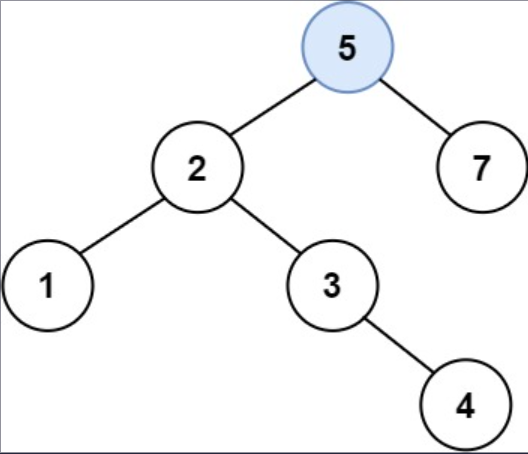1/16/24About 3 min
I Problem
You are given the root node of a binary search tree (BST) and a value to insert into the tree. Return the root node of the BST after the insertion. It is guaranteed that the new value does not exist in the original BST.
Notice that there may exist multiple valid ways for the insertion, as long as the tree remains a BST after insertion. You can return any of them.
Example 1
Input: root = [4, 2, 7, 1, 3], val = 5
Output: [4, 2, 7, 1, 3, 5]
Explanation: Another accepted tree is:
Example 2
Input: root = [40, 20, 60, 10, 30, 50, 70], val = 25
Output: [40, 20, 60, 10, 30, 50, 70, null, null, 25]
Example 3
Input: root = [4, 2, 7, 1, 3, null, null, null, null, null, null], val = 5
Output: [4, 2, 7, 1, 3, 5]
Constraints
- The number of nodes in the tree will be in the range
[0, 10⁴]. -10⁸ <= Node.val <= 10⁸- All the values
Node.valare unique. -10⁸ <= val <= 10⁸- It's guaranteed that
valdoes not exist in the original BST.
Related Topics
- Tree
- Binary Tree
- Binary Search Tree
II Solution
Rust Node Definition
#[derive(Debug, PartialEq, Eq)]
pub struct TreeNode {
pub val: i32,
pub left: Option<Rc<RefCell<TreeNode>>>,
pub right: Option<Rc<RefCell<TreeNode>>>,
}
impl TreeNode {
#[inline]
pub fn new(val: i32) -> Self {
TreeNode {
val,
left: None,
right: None,
}
}
}Java Node Definition
public class TreeNode {
int val;
TreeNode left;
TreeNode right;
TreeNode() {}
TreeNode(int val) { this.val = val; }
TreeNode(int val, TreeNode left, TreeNode right) {
this.val = val;
this.left = left;
this.right = right;
}
}Approach 1: Recursion
Rust
pub fn insert_into_bst(root: Option<Rc<RefCell<TreeNode>>>, val: i32) -> Option<Rc<RefCell<TreeNode>>> {
//Self::recur_helper_1(root, val
Self::recur_helper_2(root, val)
}
fn recur_helper_1(root: Option<Rc<RefCell<TreeNode>>>, val: i32) -> Option<Rc<RefCell<TreeNode>>> {
let new = Some(Rc::new(RefCell::new(TreeNode::new(val))));
if root.is_none() {
return new;
}
const TRAVERSAL: fn(Option<Rc<RefCell<TreeNode>>>, i32, Option<Rc<RefCell<TreeNode>>>) =
|root, val, new| {
if let Some(curr) = root {
let curr_val = curr.borrow().val;
if val > curr_val {
let right = curr.borrow().right.clone();
if right.is_some() {
TRAVERSAL(right, val, new);
} else {
curr.borrow_mut().right = new;
}
} else {
let left = curr.borrow().left.clone();
if left.is_some() {
TRAVERSAL(left, val, new);
} else {
curr.borrow_mut().left = new;
}
}
}
};
TRAVERSAL(root.clone(), val, new);
root
}
fn recur_helper_2(root: Option<Rc<RefCell<TreeNode>>>, val: i32) -> Option<Rc<RefCell<TreeNode>>> {
const TRAVERSAL: fn(Option<Rc<RefCell<TreeNode>>>, i32) -> Option<Rc<RefCell<TreeNode>>> =
|root, val| match root {
None => Some(Rc::new(RefCell::new(TreeNode::new(val)))),
Some(curr) => {
let curr_val = curr.borrow().val;
if val > curr_val {
let right = curr.borrow_mut().right.take();
curr.borrow_mut().right = TRAVERSAL(right, val);
} else {
let left = curr.borrow_mut().left.take();
curr.borrow_mut().left = TRAVERSAL(left, val);
}
Some(curr)
}
};
TRAVERSAL(root, val)
}Java
public TreeNode insertIntoBST(TreeNode root, int val) {
//return this.recurHelper1(root, val);
return this.recurHelper2(root, val);
}
BiConsumer<TreeNode, TreeNode> traversal1 = (root, newNode) -> {
if (root == null) {
return;
}
if (newNode.val > root.val) {
TreeNode right = root.right;
if (right != null) {
this.traversal1.accept(right, newNode);
} else {
root.right = newNode;
}
} else {
TreeNode left = root.left;
if (left != null) {
this.traversal1.accept(left, newNode);
} else {
root.left = newNode;
}
}
};
TreeNode recurHelper1(TreeNode root, int val) {
TreeNode node = new TreeNode(val);
if (root == null) {
return node;
}
this.traversal1.accept(root, node);
return root;
}
BiFunction<TreeNode, Integer, TreeNode> traversal2 = (root, val) -> {
if (root == null) {
return new TreeNode(val);
}
if (val > root.val) {
root.right = this.traversal2.apply(root.right, val);
} else {
root.left = this.traversal2.apply(root.left, val);
}
return root;
};
TreeNode recurHelper2(TreeNode root, int val) {
return this.traversal2.apply(root, val);
}Approach 2: Iteration
Rust
pub fn insert_into_bst(root: Option<Rc<RefCell<TreeNode>>>, val: i32) -> Option<Rc<RefCell<TreeNode>>> {
//Self::iter_helper_1(root, val)
Self::iter_helper_2(root, val)
}
fn iter_helper_1(root: Option<Rc<RefCell<TreeNode>>>, val: i32) -> Option<Rc<RefCell<TreeNode>>> {
let new = Some(Rc::new(RefCell::new(TreeNode::new(val))));
if root.is_none() {
return new;
}
let mut root_node = root.clone();
while let Some(curr) = root_node {
let curr_val = curr.borrow().val;
let (next, is_right) = if val > curr_val {
(curr.borrow().right.clone(), true)
} else {
(curr.borrow().left.clone(), false)
};
if next.is_some() {
root_node = next;
} else {
if is_right {
curr.borrow_mut().right = new;
} else {
curr.borrow_mut().left = new;
}
break;
}
}
root
}
fn iter_helper_2(root: Option<Rc<RefCell<TreeNode>>>, val: i32) -> Option<Rc<RefCell<TreeNode>>> {
let new = Some(Rc::new(RefCell::new(TreeNode::new(val))));
if root.is_none() {
return new;
}
let mut root_node = root.clone();
while let Some(curr) = root_node {
let curr_val = curr.borrow().val;
if val > curr_val {
let right = curr.borrow().right.clone();
if right.is_some() {
root_node = right;
} else {
curr.borrow_mut().right = new;
break;
}
} else {
let left = curr.borrow().left.clone();
if left.is_some() {
root_node = left;
} else {
curr.borrow_mut().left = new;
break;
}
}
}
root
}Java
public TreeNode insertIntoBST(TreeNode root, int val) {
//return this.iterHelper1(root, val);
return this.iterHelper2(root, val);
}
TreeNode iterHelper1(TreeNode root, int val) {
TreeNode node = new TreeNode(val);
if (root == null) {
return node;
}
TreeNode rootNode = root;
while (rootNode != null) {
TreeNode next;
boolean isRight;
if (val > rootNode.val) {
next = rootNode.right;
isRight = true;
} else {
next = rootNode.left;
isRight = false;
}
if (next != null) {
rootNode = next;
} else {
if (isRight) {
rootNode.right = node;
} else {
rootNode.left = node;
}
break;
}
}
return root;
}
TreeNode iterHelper2(TreeNode root, int val) {
TreeNode node = new TreeNode(val);
if (root == null) {
return node;
}
TreeNode curr = root;
while (curr != null) {
if (val > curr.val) {
TreeNode right = curr.right;
if (right != null) {
curr = right;
} else {
curr.right = node;
break;
}
} else {
TreeNode left = curr.left;
if (left != null) {
curr = left;
} else {
curr.left = node;
break;
}
}
}
return root;
}